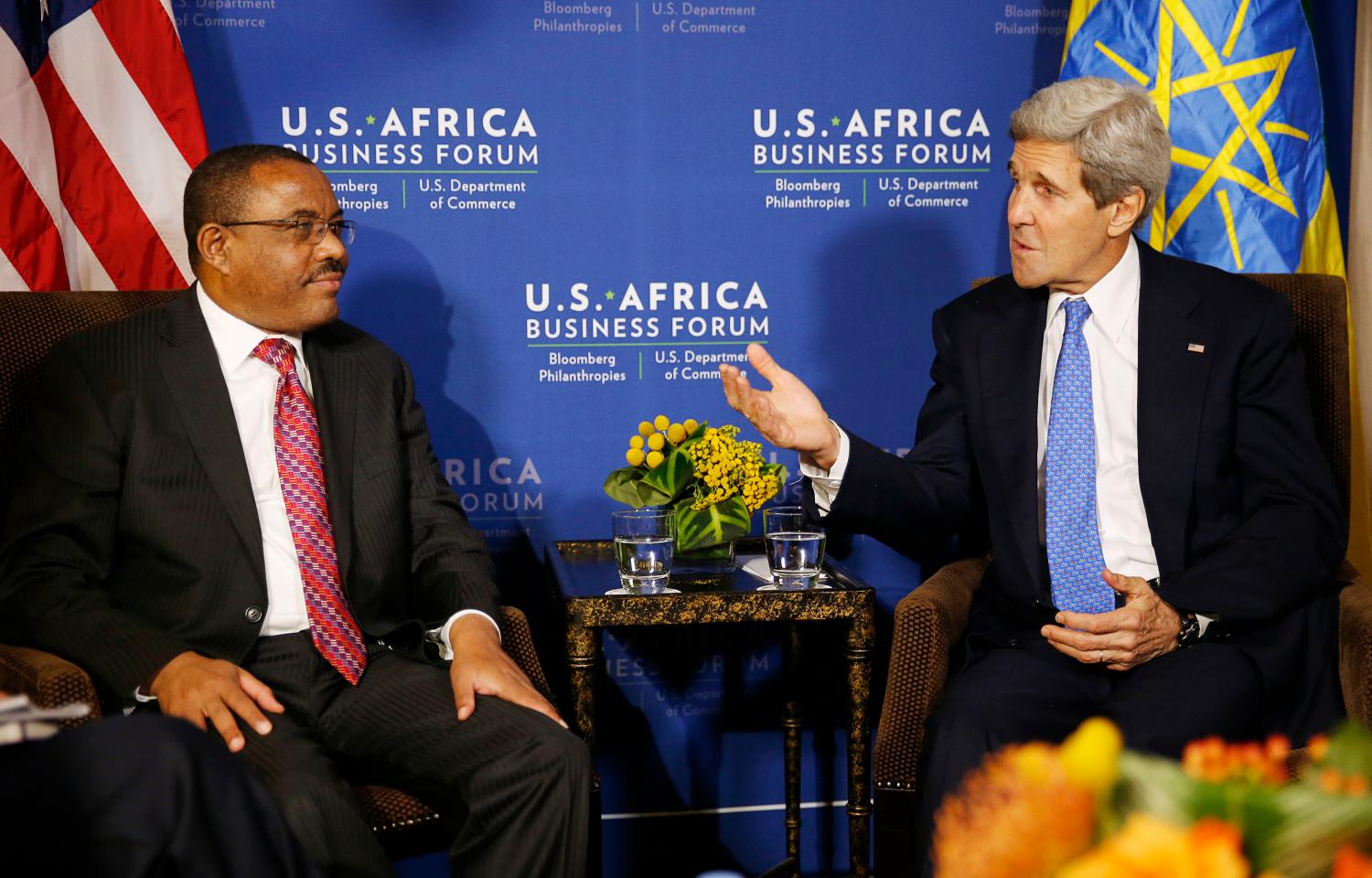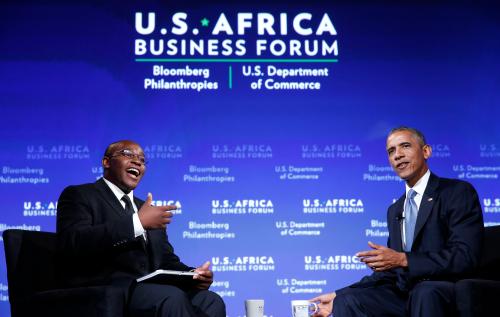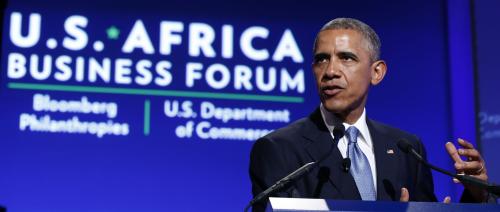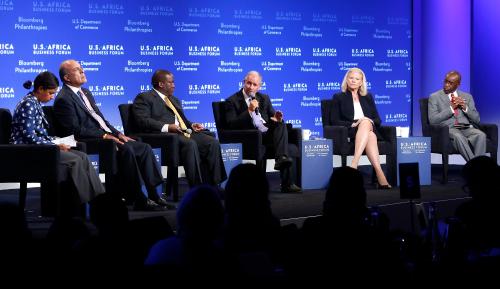Two years after the first U.S.-Africa Leaders Summit and Business Forum brought together U.S. and African CEOs in addition to heads of state and government, the U.S. will convene a second U.S.-Africa Business Forum on September 21, 2016 in New York City. Co-hosted by Bloomberg Philanthropies and the U.S. Department of Commerce, the forum will emphasize opportunities for expanding U.S.-Africa business, trade, and investment ties in key sectors positioned for growth, such as finance and capital investment, infrastructure, power and energy, agriculture, consumer goods, and information communication technology. While at the inaugural forum in 2014, nearly 150 CEOs from U.S. and African companies announced more than $33 billion in new deals—thus highlighting Africa as a strategic business and investment destination—this year, the forum promises to delve further into the question “How do you effectively do business in Africa?” It will also serve as an opportunity to assess how far the U.S. has come in fulfilling its commitments from the last forum to the continent.[1]
Progress in U.S.-Africa trade and investment initiatives
So where do U.S.-supported economic goals in Africa stand two years after the inaugural forum? To answer this question, we examine some of the commitments made at the 2014 forum and discuss their progress and outcomes to date.
Translating the energy and positivity from the first U.S.-Africa Business Forum into concrete trade and investment gains has no doubt been an arduous task. Many of the initiatives stemming from the first forum require immense political or technical lifts in order to be operationalized. For example, common roadblocks to large infrastructure—including energy projects—are standards, procurement, taxes, and project financing, which require technical expertise and coordination with local partners and sometimes regional and multilateral stakeholders. Implementation has been notably slow-going in some respects, as various U.S. government agencies are attempting to address multiple, complex, and mutually reinforcing facets to doing business in Africa simultaneously. Ultimately, implementation of these projects depends not only on U.S. leadership but largely on support from national systems and local political will too. Despite the slowdowns, however, there is still a general acknowledgement among U.S. business leaders that the conditions for doing business in Africa are progressively improving, and there is “money to be made” in the continent.
Several important achievements have been reached: For instance, as a part of the Trade Africa initiative, the U.S. signed a Cooperation Agreement on “Trade Facilitation, Sanitary and Phytosanitary Measures, and Technical Barriers to Trade” with the East African Community (EAC) in February 2015. This agreement aims to advance EAC partner states’ ability to meet international quality and safety standards by improving the countries’ technical regulations, standards, testing, and certification systems. Furthermore, in June 2015, President Obama signed the African Growth and Opportunity Act (AGOA) Trade Preferences Extension Act of 2015 into law, extending AGOA for 10 years. Another bill, the AGOA Enhancement Act, which was recently referred to the Senate Committee on Foreign Relations, builds upon the 2015 AGOA Act to allow the Millennium Challenge Corporation (MCC) to make regional compacts possible and encourage regional trade capacity building efforts in the Africa. So far, it seems progress has been made in implementing policies to meet trade-oriented goals, including both demand side (tariffs, quotas, etc…) and supply-side constraints (trade capacity, international standards, etc…). Power Africa, another key initiative of the current administration, has continued expanding energy access through the continent with some promising results, and with the enactment of the Electrify Africa Act in February 2016, U.S. support for ending energy poverty in Africa has become law.
On the business front, the U.S. Department of Commerce has doubled its presence in sub-Saharan Africa: It has established new offices in Angola, Tanzania, Ethiopia, and Mozambique, expanded its operations in Ghana, and reinstated a position at the African Development Bank. In turn, it increased the number of foreign commercial service officers in the region who provide crucial support to U.S. and African firms including counseling and technical assistance. It also held a number of events across the continent and in the U.S.—including the Trade Winds Business Forum and trade missions in eight African countries—to connect U.S. firms with local decisionmakers and business opportunities. Meanwhile, the Department of Commerce’s Presidential Advisory Council on Doing Business in Africa led a fact-finding mission to Nigeria and Rwanda to learn from local stakeholders how U.S. government programs and policies can better support economic engagement between the U.S. and the region. From these visits, as well as several council meetings, the group compiled a series of in-depth reports, identifying the key successes and gaps of the U.S.-Africa business relations and providing guidance on future engagement.
From action to outcomes: A complicated picture
These notable policy achievements, however, are not necessarily reflected in the latest figures on trade outcomes between the U.S. and Africa. According to the IMF Direction of Trade Statistics, exports from the U.S. to African countries have actually decreased overall from $25.1 billion in 2014 to $17.5 billion in 2015, mostly due to huge declines in U.S. exports to Nigeria, South Africa, Angola, Togo, and Kenya. The drop in U.S. exports to Africa could be somewhat explained by the lower growth environment in the region, generally reducing demand for exports. Similarly, African imports to the U.S. decreased from $26.7 billion in 2014 to $18.8 billion in 2015, with the largest declines in imports from oil-exporters Angola, Nigeria, and Chad. Over the same period, the U.S. began shifting away from importing oil from African countries in favor of domestically produced oil. While these declines might seem to signal bad news for U.S.-Africa trade, U.S. exports and imports to the world (excluding the region) also declined from 2014 to 2015 as did global trade, indicating a broader slump across the international trading system, resultant from lower commodity prices as well as China’s diminished growth and import demand.
In terms of investment, according to Ernst & Young’s 2016 Africa Attractiveness Survey Program, the U.S. was the largest investor in the continent in terms of number of greenfield FDI projects in 2015, retaining its top position from the previous year—despite a 4 percent decline in projects. Unfortunately, taking a more granular look at the projects and specifically attempting to track the progress of deals reached during the 2014 forum is extremely difficult, except when individual companies choose to publicize their follow-up or they receive coverage from business reporters. For example, at the last forum, Coca-Cola announced that it would invest $5 billion over the next six years in Africa to fund new manufacturing lines and to create additional jobs across the supply chain. In June 2016, the firm opened a bottling plant in Mozambique, and later that month, in a merger with SABMiller and Gutsche Family Investment (Coca-Cola Beverages Africa), it announced that the new African company will expand services to 14 African countries and create more than 30 bottling plants throughout the continent. As the case of Coca-Cola shows, firms are implementing their promises across the continent, although is difficult to gauge to what extent companies have followed through on their stated commitments.
Expectations and recommendations for the second U.S.-Africa Business Forum
The U.S.-Africa Business Forum series provides an excellent platform through which to launch a conversation, but requires concrete follow up from all stakeholders in order to precipitate action. Given the brevity of the forum, it is important for both U.S. and African partners to come to the table prepared—with strategies highlighting their key asks and the mutual benefits afforded to all partners—in order to take full advantage of their time together. Moreover, presenting updates on the investments and deals made at the last forum and publishing them on the forum website would provide greater transparency on these initiatives and allow U.S. and African companies to benefit from the lessons learned in various country- and sector-specific contexts.
It is also important for the right mix of leaders to connect during the forum in order to achieve the specific goals outlined by the administration through its Doing Business in Africa campaign—one of which includes job creation in the U.S. and Africa. While it is expected that the usual suspects from large African multinationals will attend, it is not clear whether African small and medium enterprises (SMEs) will be adequately represented at the forum. Considering that 66-80 percent of the formal employment in the region is in SMEs, and 50 percent of job creation comes from enterprises with less than 100 employees,[2] it is crucial that these players be considered active and vital contributors to Africa’s thriving business community and invited to the forum as well. That being said, it is worth noting that the U.S. does recognize the value of African SMEs through other means, including a wide array of development programming and the Global Entrepreneurship summit for SME leaders and entrepreneurs, which was held in Kenya in 2015.
Lastly, going forward, ensuring adequate support for U.S. investors and firms in Africa is imperative if the deals reached at the forum are to be successfully implemented. A larger presence of foreign commercial service officers, commerce specialists, and similar embassy support throughout the continent could facilitate many of the issues related to deal flow, legal regulations, and customs that currently serve as bottlenecks to greater U.S. business and investment. Providing targeted support for deals related to the Power Africa initiative and ensuring coordination with the regional Southern Africa Trade Hub as well as the East and West Africa Trade and Investment Hubs would help achieve U.S. and African business and development objectives simultaneously.
In conclusion, irrespective of our expectations for the forum, the next administration should keep building on the momentum behind U.S.-Africa business and investment promotion and follow through on the expert recommendations identified by the President’s Advisory Council on Doing Business in Africa.
[1] The White House released a number of statements identifying U.S. business and investment commitments to Africa during the 2014 U.S.-Africa Leaders Summit and Business Forum: They can be accessed here.
[2] According to figures from the International Labor Organization (ILO).
The Brookings Institution is committed to quality, independence, and impact.
We are supported by a diverse array of funders. In line with our values and policies, each Brookings publication represents the sole views of its author(s).










Commentary
The US-Africa Business Forum: Assessing progress and considering the stakes
September 16, 2016